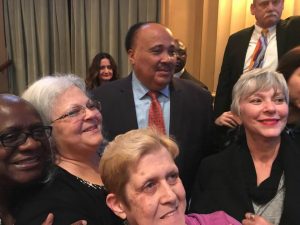This past Saturday in Charlottesville, Va., I watched the premier of the film Charlottesville, produced by the University of Virginia's Center for Politics.
The film begins by lamenting the fact that the word "Charlottesville" now means to many people not our city but an August 2017 fascist rally in our city. Yet the film is entirely about that rally and is titled "Charlottesville" which will presumably contribute to the problem it laments.
I hope it does, because I hope the film is widely seen. It does an excellent job and a much better job than I had expected of telling the story of what happened last year, and of what led up to it, and of what followed from it thus far.
Shortly after the white supremacists made the news in Charlottesville last year, I published a list of the top 10 misconceptions about the story. They've largely remained common misconceptions, but the new film, which will be showing on public television stations in the coming months, addresses a surprising number of them.
The film does a good job of conveying both the fact that the racists created the problem, and the fact that some of the anti-racists were just as intent on violence. It also does a good job of explaining how disastrous were some of the decisions of the local government and courts, and in particular the grossly incompetent actions of the police. The film does a decent job of explaining what was horribly wrong with President Donald Trump's behavior after the fascist fiasco, though it might have been stronger on his incitement of hatred and violence in the preceding two years.
A number of friends and acquaintances of mine appear in the film, some of whom I asked about it afterwards, and those I asked were all quite pleased, as was I. Still, I would offer the following friendly amendments.
The film gives the false impression that Virginia law forbids localities taking down specifically Confederate monuments and that there is no dispute about the interpretation of that law. In reality, Virginia law forbids taking down any war monument at all that's been erected recently, and there are strong reasons to believe it does not apply to any war monuments put up in the 1920s.
The film never mentions that Virginia law much more clearly forbids localities to ban guns from public events. Nor do we learn that Charlottesville could have banned all non-gun weapons, exactly as it did on the 1-year anniversary of the racist rally. Consequently, we hear no discussion in the movie of whether an armed rally by people threatening violence and having engaged in violence the evening before should be protected by the First Amendment in the same way an unarmed rally by non-threatening people should be. The police are criticized for having allowed violence in order to cite it as grounds for shutting the event down, but why violence the night before didn't suffice isn't explained.
In the film, Larry Sabato asks rhetorically and repeatedly how U.S. society went so wrong. One concern with that question might be that this sort of hatred has always been present. But a more direct concern for me is that the film doesn't try to answer the question. In its defense, it is already a two-hour film with very few minutes wasted. But it's a film that (I hope unintentionally) had part of the audience in the theater cheering for anti-racist violence. It's a film that, to its credit, includes one man describing his conversations with racists and the need for dialogue rather than shouting. It's a film that has the mother of the woman killed that day speaking similar wisdom. But nobody from the white supremacists is asked to explain himself in the movie.
We're told that the Unite the Right rally's main organizer had been part of Occupy Charlottesville in 2011 until being kicked out for advocating violence. What, at that point, might have directed him differently? Martin Luther King III, after the film, described a participant in the rally who had since had a change of heart. King also argued that anti-racist violence won't work, that only nonviolent activism and understanding will. How might we try to understand the people whose views we condemn, as I proposed we do two days before the hate came to town?
Violence and bigotry are made acceptable by example, and not only by Republican or Nazi example. I mentioned to Martin Luther King III after the event that next April 4, Washington D.C. is to host an anniversary celebration of NATO, but that peace organizations are planning our own events opposing militarism and celebrating instead the nonviolent vision of Martin Luther King Jr. On Saturday King suggested that not everyone need be an activist, but that everyone should vote. I would respecfully suggest that if the Center for Politics can turn activist, anyone can, and that unless a lot more people do, we're in grave danger.
Here's a TED Talk I gave on the topic of Charlottesville and war monuments.
.youtube.com/watch?time_continue=1&v=Vsw8f-L4mME






